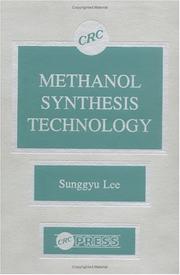| Listing 1 - 10 of 305 | << page >> |
Sort by
|
Book
Year: 2014 Publisher: Copenhagen : Nordic Council of Ministers,
Abstract | Keywords | Export | Availability | Bookmark
 Loading...
Loading...Choose an application
- Reference Manager
- EndNote
- RefWorks (Direct export to RefWorks)

ISBN: 084934610X Year: 1990 Publisher: Boca Raton, Fla. : CRC Press,
Abstract | Keywords | Export | Availability | Bookmark
 Loading...
Loading...Choose an application
- Reference Manager
- EndNote
- RefWorks (Direct export to RefWorks)
Book
ISBN: 0824770072 9780824770075 Year: 1983 Volume: 10 Publisher: New York (N.Y.) : Dekker,
Abstract | Keywords | Export | Availability | Bookmark
 Loading...
Loading...Choose an application
- Reference Manager
- EndNote
- RefWorks (Direct export to RefWorks)
Hydrocarbons --- Methanol --- Hydrocarbons. --- Methanol.
Book
ISBN: 8301114908 Year: 1994 Publisher: Warszawa : Polish Scientific Publishers,
Abstract | Keywords | Export | Availability | Bookmark
 Loading...
Loading...Choose an application
- Reference Manager
- EndNote
- RefWorks (Direct export to RefWorks)
Book
Year: 1982 Publisher: [Ann Arbor, Mich.] : Standards Development and Support Branch, Emission Control Technology Division, Office of Mobile Source Air Pollution Control, Office of Air, Noise and Radiation, U.S. Environmental Protection Agency,
Abstract | Keywords | Export | Availability | Bookmark
 Loading...
Loading...Choose an application
- Reference Manager
- EndNote
- RefWorks (Direct export to RefWorks)
Ammonia industry. --- Ammonia. --- Methanol as fuel. --- Methanol. --- Methanol fuel industry.
Book
Year: 1982 Publisher: [Ann Arbor, Mich.] : Standards Development and Support Branch, Emission Control Technology Division, Office of Mobile Source Air Pollution Control, Office of Air, Noise and Radiation, U.S. Environmental Protection Agency,
Abstract | Keywords | Export | Availability | Bookmark
 Loading...
Loading...Choose an application
- Reference Manager
- EndNote
- RefWorks (Direct export to RefWorks)
Ammonia industry. --- Ammonia. --- Methanol as fuel. --- Methanol. --- Methanol fuel industry.
Book
ISSN: 0250863X ISBN: 9241571969 Year: 1997 Volume: 196
Abstract | Keywords | Export | Availability | Bookmark
 Loading...
Loading...Choose an application
- Reference Manager
- EndNote
- RefWorks (Direct export to RefWorks)
Methanol --- Methanol --- Environmental Exposure --- toxicity --- adverse effects
Book
Year: 1981 Publisher: Liège : Association des ingénieurs sortis de l'Université de Liège,
Abstract | Keywords | Export | Availability | Bookmark
 Loading...
Loading...Choose an application
- Reference Manager
- EndNote
- RefWorks (Direct export to RefWorks)
Book
Year: 1994 Publisher: [Ann Arbor, MI] : U.S. Environmental Protection Agency, Office of Mobile Sources,
Abstract | Keywords | Export | Availability | Bookmark
 Loading...
Loading...Choose an application
- Reference Manager
- EndNote
- RefWorks (Direct export to RefWorks)
Methanol as fuel. --- Methanol --- Automobiles --- Toxicology.
Book
Year: 2009 Publisher: Bruxelles: UCL,
Abstract | Keywords | Export | Availability | Bookmark
 Loading...
Loading...Choose an application
- Reference Manager
- EndNote
- RefWorks (Direct export to RefWorks)
Ethylene glycol and methanol intoxications are both rare but often lethal, especially if treatment is delayed. Little toxicity is associated with the alcohos themselves. Rather, their metabolites, formic acid (for methanol) and glycolic acid (for ethylene glycol) are responsible for adverse effects such as retinal or optic nerve and renal injury respectively. Both metabolites create a metabolic acidosis with osmotic and anionic gap, with facilitates diagnosis. Supportive care and correction of acidosis are essential for the treatment of alcohol intoxication. The metabolism of both, ethylene glycol and methanol, occurs primarily through the hepatic alcohol deshydrogenase. Antidotes such as ethanol and fomepizole are both competitive inhibitors of this enzyme, and prevent formation of toxic metabolites. Ethanol therapy has several drawbacks such as erratic pharmacokinetics and frequent side effects (changes in mental status, hypoglycemia, pancreatitis,…). Fomepizole use (4-methylpyrazole), on the other hand, is quite safe and is associated with few side effects but high cost of therapy is of concern in the opinion of some toxicologists. Use of both antidotes, hemodilaysis and eventually cofacteurs such as vitamine B6 and folic acid will be discussed. Practical issues such as guidelines adherence and stocking of antidores in belgian hospitals will also be adressed Les intoxications au méthanol ou à l’éthylène glycol sont relativement rares mais souvent mortelles si elles ne sont pas rapidement prises en charge. Ces deux alcools sont métabolisés par l’alcool déshydrogénase en métabolite toxique : l’acide formique pour le méthanol et l’acide glycolique pour l’éthylène glycol. Le premier peut provoquer une cécité irréversible, le second une insuffisance rénale aiguë, des convulsions, des problèmes cardio-respiratoires liés au dépôt de cristaux d’oxalate et les deux provoquent une acidose métabolique avec trou anionique élevé. Mise à part la prise en charge générale (traitements supportifs et correction de l’acidose), le traitement consiste à empêcher la production de métabolites toxiques en administrant un inhibiteur de l’alcool déshydrogénase et à augmenter l’élimination des métabolites déjà produits. L’éthanol est utilisé dans cette indication, depuis de nombreuses années, mais l’administration est excessivement difficile à cause d’un cinétique variable et provoque de nombreux effets secondaires (altération de la conscience, hypoglycémies, pancréatites….). Depuis une vingtaine d’année, le fomépizole (4-méthylpyrazole), un autre inhibiteur de l’alcool déshydrogénase, est aussi utilisé : celui-ci présente moins d’effets secondaires et son désavantage majeur est son coût.
L’usage de ces deux antidotes, de la dialyse et des cofacteurs, comme la vitamine B6 et l’acide folique, sera discuté. De plus, des problèmes pratiques tels que l’adhérence aux guidelines et le stockage des antidotes dans les hôpitaux belges seront évoqués
Ethylene Oxide --- Methanol --- Ethylene Oxide --- Methanol
| Listing 1 - 10 of 305 | << page >> |
Sort by
|

 Search
Search Feedback
Feedback About
About Help
Help News
News